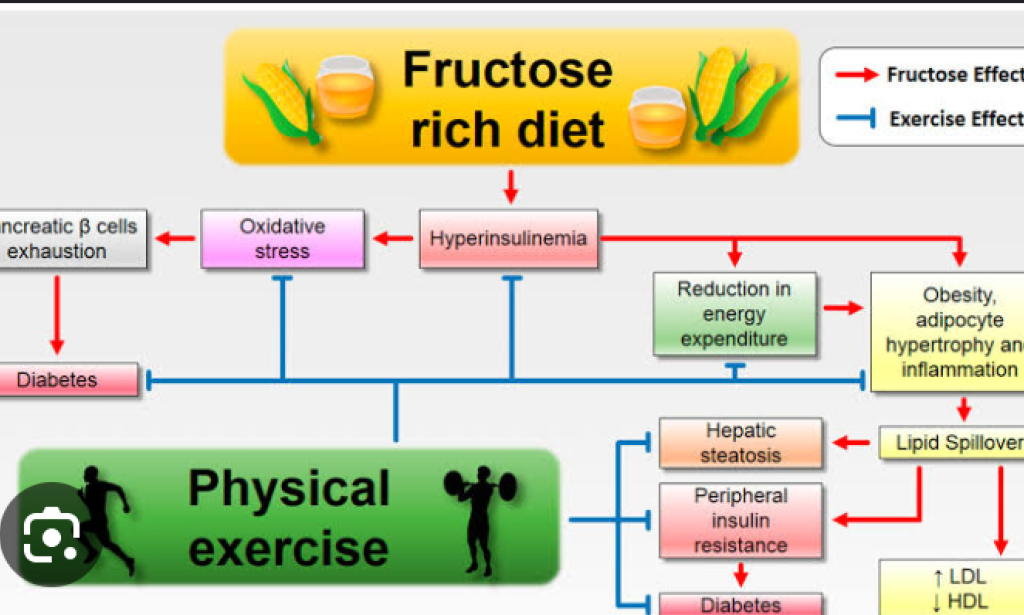Obesity has become a significant health concern worldwide, with a dramatic increase in its prevalence over the past few decades. The complex nature of obesity involves various factors, including genetics, lifestyle, diet, and environmental influences. Among the dietary components that have garnered attention in relation to obesity is fructose, a natural sugar found in fruits, honey, and many processed foods. In this essay, we will explore the connection between fructose consumption and obesity, examining the mechanisms, scientific studies, and potential implications for public health.
Fructose is a monosaccharide, or simple sugar, which is naturally found in fruits, some vegetables, and plant-derived sweeteners like honey and agave. It is also a component of sucrose (table sugar) and high-fructose corn syrup (HFCS), a common sweetener used in many processed foods and beverages. While fructose itself is not inherently harmful, the quantity and context in which it is consumed are essential factors in understanding its potential impact on health.
One of the key concerns regarding fructose consumption and obesity is the effect on metabolic processes. Unlike glucose, another simple sugar that is a primary energy source for the body, fructose is metabolized differently. When we consume glucose, it's primarily absorbed by cells throughout the body, including muscle cells, where it can be used for energy or stored as glycogen. However, fructose is primarily metabolized in the liver, where it can contribute to the production of fats (lipogenesis) and increase triglyceride levels, potentially leading to fatty liver disease and insulin resistance.
Several studies have investigated the relationship between fructose consumption and obesity. Some of these studies suggest that excessive fructose intake may contribute to weight gain, especially when consumed in the form of sugary beverages. High consumption of fructose-sweetened beverages has been linked to an increased risk of obesity, type 2 diabetes, and other metabolic disorders. It's essential to note that these studies often focus on the excessive consumption of added sugars, including fructose, rather than the natural sugars found in whole fruits.
A 2019 review published in the journal "Advances in Nutrition" discussed the impact of fructose on obesity. The review highlighted that excessive fructose intake, especially in the form of added sugars, can lead to an increase in overall caloric intake, reduced satiety (feeling of fullness), and a higher likelihood of developing insulin resistance. These factors, when combined, can contribute to weight gain and obesity.
The concept of "sugar addiction" has also been proposed in the context of fructose consumption. Some researchers suggest that excessive sugar intake, including fructose, can activate reward centers in the brain, leading to a cycle of craving and overconsumption, which may contribute to obesity. However, the idea of sugar addiction is still a topic of debate within the scientific community, and more research is needed to fully understand its implications.
It's important to emphasize that not all sources of fructose are equal in their impact on health. Whole fruits, despite containing fructose, provide essential nutrients, dietary fiber, and antioxidants. The fiber in fruits slows down the absorption of sugars, leading to a more gradual rise in blood sugar levels and promoting satiety. Additionally, the vitamins and minerals found in fruits are essential for overall health.
The concern arises when fructose is consumed in excessive amounts from processed foods, sugary beverages, and foods high in added sugars. These sources of fructose often lack the beneficial components present in whole fruits, leading to a more rapid spike in blood sugar levels and potentially contributing to overconsumption.
Public health initiatives have recognized the need to address excessive sugar consumption to combat obesity. Some countries have implemented policies to reduce the consumption of sugary beverages by imposing taxes on sugary drinks or implementing restrictions on marketing unhealthy foods to children. These measures aim to reduce the overall consumption of added sugars, including fructose, which could have a positive impact on obesity rates.
In conclusion, the connection between fructose consumption and obesity is a complex topic that requires careful consideration of various factors. While fructose itself is a natural sugar found in fruits and honey, excessive consumption of added sugars, including fructose in the form of high-fructose corn syrup, has been associated with an increased risk of obesity and metabolic disorders. It's essential to differentiate between the sugars naturally present in whole fruits and the added sugars in processed foods. Public health efforts to reduce the consumption of sugary beverages and promote a balanced diet can play a crucial role in addressing the obesity epidemic. As our understanding of the relationship between fructose and obesity continues to evolve, further research will be essential to guide effective strategies for preventing and managing this global health issue.

You must be logged in to post a comment.